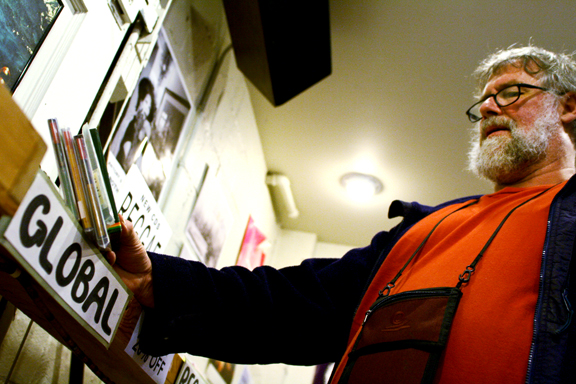A changing game: Digital technology has changed our musical lives
January 10, 2010 by Justin Langille · Leave a Comment

Slocan Valley resident Charles Van Toorn picks up world music at Zulu.(Justin Langille/Kwantlen Chronicle)
In his 10-year run as general manager of Zulu Records, Nic Bragg has seen his customers’ connection to music transformed drastically during the revolution brought on by MP3s and the Internet.
“It doesn’t really have a value anymore,†Bragg said. “The relationship has changed. Your music tastes are constantly evolving and you’re constantly consuming, as well as purging music.â€
The devaluation of music has been encouraged by the transition of traditional music journalism into the online forum, Bragg said. He said that taste-making websites like Pitchfork.com have encouraged lifestyle branding of artists.
“I went to Chicago to their [Pitchfork’s] music festival and basically, it’s like a Wal-Mart of independent culture. Shoe companies and other companies are paying to be at the festival to market to the demographic,†he said.
Bragg is skeptical about Pitchfork’s willingness to turn music fans into customers for corporate wares, a common practice in commercial culture, but guarded against in grassroots music circles. Most of them that is.
On the other side of Vancouver, Edo Van Breeman, owner of label Unfamiliar Records, is ecstatic about Pitchfork’s marketing power.
Unfamiliar Records is the Canadian home of Pitchfork favourites Japandroids. Last year, Van Breeman sent Pitchfork a press release for the punk band’s debut album, Post-Nothing. The album was immediately given the prestigious Best New Music title, the site’s gold seal of approval. Overnight success ensued.
“You could attribute, at least preliminarily, 100 per cent of their success to that review,†said Van Breeman. “Pitchfork is a unique case. They’re like the online, modern Rolling Stone.â€
Although Van Breeman believes that Pitchfork’s support was pivotal to Japandroids’ success, he also thinks that if the band hadn’t gone on the road to meet fans and tour as much as it did afterwards, it wouldn’t have done so well.
“You also have a lot of best-new-music designations that don’t do as well as Japandroids. I think that has a lot to do with how the band has toured and how the band is marketed. It’s not like you get the review and bingo, you’re a big band. You have to work for it as well,†Van Breeman said.
Bragg concedes that around 2006, when Zulu Records started to see a decline in sales because of music pirating and online sales, a renaissance in live music began. As musicians could count less and less on traditional income from the sales of LPs and CDs, they hit the road to deliver their art in person and revive the relationship between bands and their fans.
Speaking to BBC News in 2007, Stuart Galbraith, the UK managing director of LiveNation (one of the biggest concert promotion companies in the UK and North America), said that the sales of festival tickets in the UK were surging “beyond belief,†and that the live music scene in the UK was doing better than he could ever remember.
“Live music is the ultimate experience,†Galbraith told the BBC. “It’s not bootleggable, you can’t replicate it, you can’t steal it, and you can’t mimic that experience of actually standing at a gig the roar of the crowd, the smell of the greasepaint.â€
Vancouver blogger Quinn Omori would agree: he would even take it one step further. A UBC IT technician by day, Omori runs From Blown Speakers, a modest blog that presents an exhaustive list of nearly every show going on in Vancouver.
He believes that the amount of music available online hasn’t lessened the value of music for fans, but has allowed people to find music that inspires them to make music themselves, perhaps the most intimate relationship one can have with music.
“Anything you can possibly think of, anything that you might want to hear or want to emulate, you can find,†Omori said. “And you can probably find a bunch of people wanting to do the same thing.â€
Back at Zulu records, Bragg and his coworkers are still managing to get by. Pitchforkapproved artists, Canadian independent music and timeless favorites like Zeppelin and Hendrix still sell, and vinyl is making a moderate comeback among the hipster set.
Bragg said that Zulu could expand into literature and video games, the way HMV has in recent years, but he thinks the chemistry is good enough for now.
“It’s a specialized thing now. The things that you’re looking for here, you can’t find in every corner store. The record store could become pretty much like Urban Outfitters if it really wanted to, but we’re not interested in that.â€


